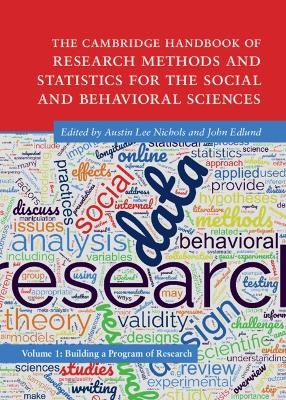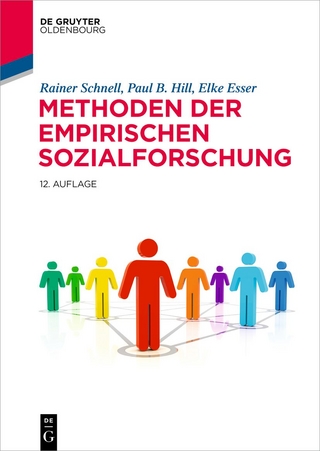
The Cambridge Handbook of Research Methods and Statistics for the Social and Behavioral Sciences
Cambridge University Press (Verlag)
978-1-316-51852-6 (ISBN)
The first of three volumes, the five sections of this book cover a variety of issues important in developing, designing, and analyzing data to produce high-quality research efforts and cultivate a productive research career. First, leading scholars from around the world provide a step-by-step guide to doing research in the social and behavioral sciences. After discussing some of the basics, the various authors next focus on the important building blocks of any study. In section three, various types of quantitative and qualitative research designs are discussed, and advice is provided regarding best practices of each. The volume then provides an introduction to a variety of important and cutting-edge statistical analyses. In the last section of the volume, nine chapters provide information related to what it takes to have a long and successful research career. Throughout the book, example and real-world research efforts from dozens of different disciplines are discussed.
Austin Lee Nichols is Associate Professor of Organizational Psychology at Central University in Vienna, Austria. Prior to his current position, he worked in various faculty and research positions around the world in both Psychology and Management. He has published in journals across a variety of research disciplines and has won awards for his teaching, research, and service from various global institutions. John E. Edlund is Professor of Psychology at the Rochester Institute of Technology, USA, and serves as the Research Director of Psi Chi: The International Honor Society in Psychology. He has won numerous awards related to teaching and is passionate about the improvement of research methods and the dissemination of psychological knowledge to the world.
Section 1. From idea to reality: the basics of research: 1. Promises and pitfalls of theory Yzar S. Wehbe, Todd K. Shackelford and Laith Al-Shawaf; 2. Research ethics for the behavioral and social sciences Ignacio Ferrero and Javier Pinto; 3. Getting good ideas and making the most of them Christian S. Crandall and Mark Schaller; 4. Literature review Rachel Adams Goertel; 5. Choosing a research design Glynis M. Breakwell; 6. Building the study Martin Schnuerch and Edgar Erdfelder; 7. Analyzing data Roger Watt and Elizabeth Collins; 8. Writing the paper John F. Dovidio; Section 2. The building blocks of a study: 9. Participant recruitment Jesse Chandler; 10. Informed consent to research David S. Festinger, Karen L. Dugosh, Hannah R. Callahan and Rachel A. Hough; 11. Experimenter effects Jocelyn Parong, Mariya Vodyanyk, C. Shawn Green, Susanne M. Jaeggi and Aaron R. Seitz; 12. Debriefing and post-experimental procedures Travis D. Clark and Ginette Blackhart; Section 3. Data collection: 13. Cross-sectional studies Maninder Singh Setia; 14. Quasi-experimental research Charles S. Reichardt, Daniel Storage and Damon Abraham; 15. Non-equivalent control group pretest-posttest design in social and behavioral research Margaret Denny, Suzanne Denieffe and Kathleen O'Sullivan; 16. Experimental methods Thomas F. Denson and Craig A. Anderson; 17. Longitudinal research: a world to explore Elisabetta Ruspini; 18. Online research methods Kevin B. Wright; 19. Archival data Jason Miller; 20. Qualitative research design Sinikka Elliott, Kayonne Christy and Siqi Xiao; Section 4. Statistical approaches: 21. Data cleaning Solveig A. Cunningham and Jonathan A. Muir; 22. Descriptive and inferential statistics Martha S. Zlokovich, Daniel P. Corts and Mary Moussa Rogers; 23. Testing theories with Bayes factors Zoltan Dienes; 24. Introduction to exploratory factor analysis: an applied approach Martin Sellbom and David Goretzko; 25. Structural equation Modeling Rex B. Kline; 26. Multilevel modeling D. Betsy McCoach, Anthony J. Gambino and Sarah D. Newton; 27. Meta-analysis in the social and behavioral sciences Jessica Gurevitch, Anne Moyer and Yuri Jadotte; 28. Qualitative analysis Nicky Hayes; 29. Designing a line of research Sheldon Solomon, Jeff Greenberg and Tom Pyszczynski; Section 5. Tips for a successful research career: 30. Successfully publishing research in the social and behavioral sciences Sicong Liu and Dolores Albarracin; 31. Presenting your research Kelly Cuccolo; 32. Building fruitful collaborations Mary G. Carey and Wendy M. Brunner; 33. Performing a good peer review Klaus Fiedler and Christian Unkelbach; 34. Handling submitted manuscripts: as editor and author Lisa L. Harlow; 35. Grant writing basics Tamera R. Schneider, Howard C. Nusbaum and Jennifer N. Baumgartner; 36. Teaching research methods and statistics Jordan R. Wagge; 37. Working outside academia Kevin A. Byle, Jeffrey M. Cucina, Alexis Avery and Hanna Pillion.
| Erscheinungsdatum | 31.05.2023 |
|---|---|
| Reihe/Serie | Cambridge Handbooks in Psychology |
| Zusatzinfo | Worked examples or Exercises |
| Verlagsort | Cambridge |
| Sprache | englisch |
| Maße | 185 x 262 mm |
| Gewicht | 1780 g |
| Themenwelt | Geisteswissenschaften ► Psychologie |
| Sozialwissenschaften ► Soziologie ► Empirische Sozialforschung | |
| ISBN-10 | 1-316-51852-3 / 1316518523 |
| ISBN-13 | 978-1-316-51852-6 / 9781316518526 |
| Zustand | Neuware |
| Informationen gemäß Produktsicherheitsverordnung (GPSR) | |
| Haben Sie eine Frage zum Produkt? |
aus dem Bereich


